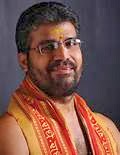Spiritual Import of Religious Festivals -14.1.3
23/11/2017.
Chapter :- 14. The Gospel of the Bhagavadgita - 1.3.
1. Introduction-3.
Now, the very purpose of this war was primarily to resolve a social conflict. Well, it was agreed that the war was indispensable. The purpose behind the war was not to destroy people but to resolve a social conflict or a political tension. It was impossible to mend people, and so they thought it was necessary to end people. And they concluded that by the ending of the people the conflict would automatically vanish. If you cannot untie a knot, you cut the knot.
For memory's sake I may mention a few names who were involved in this conflict – the leaders, the generalissimos of the war. There were powerful veterans on the side of the Kauravas, almost invincible in battle, three of whom, the most prominent ones, were Bhishma, Drona and Karna. Nobody could face them with immunity to their lives. On the other side, that of the Pandavas, we have leaders like Bhima and Arjuna, the brothers of king Yudhishthira, the eldest of the Pandavas. While the most powerful from the Kauravas side was Bhishma, the most invincible on the side of the Pandavas was Arjuna. They knew every tactic of war, and people would shudder in their hearts by merely hearing their names.
On mutual acceptance, it was agreed that the war had to be waged to end a social conflict. But, when the hour of crisis came, when the iron was hot and it had to be hit, when that moment came, what happened? A most unexpected conflict arose within the mind of Arjuna. It was not a conflict with other people, but a conflict within his own self. I told you that there are four types of conflict. The first one is conflict with other people, and to end it they embarked upon this perilous adventure of war. But before it broke out or started, the most important of the leaders, the hero of one party, the most renowned warrior, had to pass through a muddle of conflict within himself – his own thoughts, feelings, emotions, and the various tantrums of his psychological organ.
To be continued ...
Swami Krishnananda





Comments